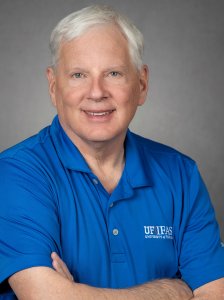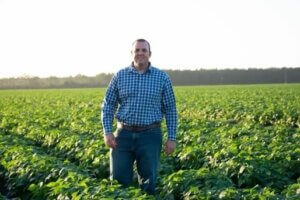July 2023 FloridAgriculture eNewsletter
 By J. Scott Angle
By J. Scott Angle
[email protected]
@IFAS_VP
When Florida agriculture and UF/IFAS identified a sudden and emergency need to update nutrient rate recommendations, we turned to a longstanding relationship—Farm Bureau members and UF/IFAS scientists.
The Farm Bureau leader is Ben Wells, vice president of the Putnam/St. Johns County Farm Bureau. The team of UF/IFAS scientists includes Christian Christensen, Lincoln Zotarelli, Lakesh Sharma, Kelly Morgan, David Liu, Tom Obreza, and others.
We never intended for our recommendations—some of which are decades old—to become regulations. But that’s where we are. So we’re doing the research on how much fertilizer goes on crops that include potatoes, tomatoes, citrus, corn, green beans, and more.
Good science depends on real-world conditions for our experiments. It’s real at Ben Wells Produce north of Hastings. Ben produces chipping and table potatoes. Like all of agriculture, it’s a tough business.
So for him to take a portion of his acreage out of commercial production, allow scientists free passage onto his property and trust them with data from his fields is an invaluable contribution to science. It gets us much closer to your reality, the conditions you work under, than the experiments we conduct on a UF/IFAS research farm where scientists control so many factors and make all the decisions.
 The support of Wells has advanced our work, especially on phosphorus rates on potatoes. Zotarelli, a professor in our Horticultural Sciences Department says industry partners like Wells provide the opportunity to demonstrate the effectiveness of our research under real-world conditions.
The support of Wells has advanced our work, especially on phosphorus rates on potatoes. Zotarelli, a professor in our Horticultural Sciences Department says industry partners like Wells provide the opportunity to demonstrate the effectiveness of our research under real-world conditions.
The team of scientists have all visited the Wells plot regularly, keeping him informed and coordinating operations so that commerce and science don’t collide. After all, the science is supposed to support your bottom line, not take away from it.
But that relationship, like all relationships, is built over time. The UF/IFAS through the Hastings Agricultural Extension Center has worked with Ben and his father for more than a decade. Wells, alongside other growers, has loaned his land, provided letters of support for research grants, and offered his wisdom and feedback on the work done on his plots.
He knows we come to discover, not to dictate. Indeed, in our most recent report to the Florida Department of Agriculture and Consumer Services, we state that the purpose of the research is to: “…achieve maximum yield and quality goals of the grower while doing so in a manner that minimizes nutrient inefficiencies to the environment.”
That trust is not only a foundation of good science, it’s a way to get it done as fast as possible. We didn’t have to spend months looking for a potato grower willing to host trials. All those Farm Bureau meetings, past partnerships, field days at Hastings, ag tours, and, of course, phone calls, made it obvious to Christian that he needed to call Ben.
It gave Ben the confidence to take that phone call, hear what the scientist had to say, and let him know it was OK to come on over and start planting—again.
UF/IFAS scientists are doing the research to protect your profit and the planet. So, in a way, is Ben. I thank him for his vital role in our science, and I hope you will, too.
Scott Angle is the University of Florida’s Senior Vice President for Agriculture and Natural Resources and leader of the UF Institute of Food and Agricultural Sciences (UF/IFAS).
